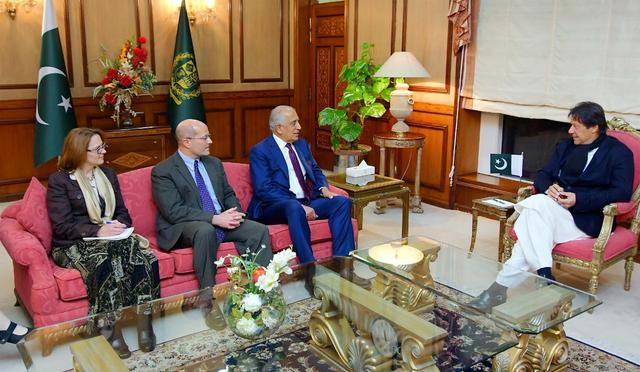angelburst29
The Living Force
Pakistan, long at odds with the United States over the war in Afghanistan, has begun to play a behind-the-scenes but central role in supporting U.S. peace talks with the Afghan Taliban, including by facilitating travel to negotiations.
February 8, 2019 - Exclusive: Once spoiler, Pakistan starts behind-scenes aid to US-Taliban talks
Exclusive: Once spoiler, Pakistan starts behind-scenes aid to...

FILE PHOTO - Pakistani Prime Minister Imran Khan (R) speaks with U.S. special envoy Zalmay Khalilzad (3rd L) during a meeting at the Prime Minister's office in Islamabad, Pakistan, in this handout photo released January 18, 2019. Press Information Department (PID)/Handout via REUTERS
The Pakistani assistance, which has not been reported in such detail before, also includes exerting pressure on Taliban leaders who fail to cooperate, including by detaining members of the militants’ families, the insurgents say.
The Pakistani role in the peace negotiations is a delicate one, with Islamabad seeking to avoid demonstrating the kind of broad influence over the Taliban that Washington has long accused it of having. Sources caution its help could be temporary.
The Taliban also do not want to appear beholden to Islamabad, which has long denied U.S. accusations that it provides safe haven and assistance to insurgents as a way to preserve influence in neighboring Afghanistan throughout its more than 17-year-old war.
Taliban sources said Pakistan’s role in bringing the Taliban to the negotiating table was instrumental. In one instance, Islamabad sent a message to the militants through religious leaders that they had to talk to the United States or risk a cut-off in ties.
They detained Taliban members’ families as a way to pressure them, a Taliban leader told Reuters.
“I haven’t seen Pakistan so serious before,” the senior Taliban leader said.
The Taliban leader, who declined to be named, said Pakistan had kept “unprecedented pressure” on the militants and their close relatives over the past few months.
“They made it clear to us that we (Taliban) have to talk to the U.S. and Afghan government,” the Taliban leader said.
U.S. General Joseph Votel, who leads the U.S. military’s Central Command, hinted at some kind of Pakistani assistance in a Senate hearing this week, saying Islamabad had “played a more helpful role.”
To be sure, current and former U.S. officials still are highly skeptical of Islamabad and do not see any steps by Pakistan that could not be easily reversed.
Washington appears for now to be sticking to a total freeze in U.S. assistance to Islamabad imposed over a year ago over its alleged support to the Taliban. Trump at the time accused Islamabad of rewarding past U.S. aid with “nothing but lies & deceit.”
“There’s some self-interest obviously involved here ... I would be wary of taking that and extrapolating off that and saying they’re now on board with the peace process,” said Jason Campbell, who was the Pentagon’s Afghanistan country director until last year.
February 8, 2019 - Exclusive: Once spoiler, Pakistan starts behind-scenes aid to US-Taliban talks
Exclusive: Once spoiler, Pakistan starts behind-scenes aid to...
FILE PHOTO - Pakistani Prime Minister Imran Khan (R) speaks with U.S. special envoy Zalmay Khalilzad (3rd L) during a meeting at the Prime Minister's office in Islamabad, Pakistan, in this handout photo released January 18, 2019. Press Information Department (PID)/Handout via REUTERS
The Pakistani assistance, which has not been reported in such detail before, also includes exerting pressure on Taliban leaders who fail to cooperate, including by detaining members of the militants’ families, the insurgents say.
The Pakistani role in the peace negotiations is a delicate one, with Islamabad seeking to avoid demonstrating the kind of broad influence over the Taliban that Washington has long accused it of having. Sources caution its help could be temporary.
The Taliban also do not want to appear beholden to Islamabad, which has long denied U.S. accusations that it provides safe haven and assistance to insurgents as a way to preserve influence in neighboring Afghanistan throughout its more than 17-year-old war.
Taliban sources said Pakistan’s role in bringing the Taliban to the negotiating table was instrumental. In one instance, Islamabad sent a message to the militants through religious leaders that they had to talk to the United States or risk a cut-off in ties.
They detained Taliban members’ families as a way to pressure them, a Taliban leader told Reuters.
“I haven’t seen Pakistan so serious before,” the senior Taliban leader said.
The Taliban leader, who declined to be named, said Pakistan had kept “unprecedented pressure” on the militants and their close relatives over the past few months.
“They made it clear to us that we (Taliban) have to talk to the U.S. and Afghan government,” the Taliban leader said.
U.S. General Joseph Votel, who leads the U.S. military’s Central Command, hinted at some kind of Pakistani assistance in a Senate hearing this week, saying Islamabad had “played a more helpful role.”
To be sure, current and former U.S. officials still are highly skeptical of Islamabad and do not see any steps by Pakistan that could not be easily reversed.
Washington appears for now to be sticking to a total freeze in U.S. assistance to Islamabad imposed over a year ago over its alleged support to the Taliban. Trump at the time accused Islamabad of rewarding past U.S. aid with “nothing but lies & deceit.”
“There’s some self-interest obviously involved here ... I would be wary of taking that and extrapolating off that and saying they’re now on board with the peace process,” said Jason Campbell, who was the Pentagon’s Afghanistan country director until last year.



